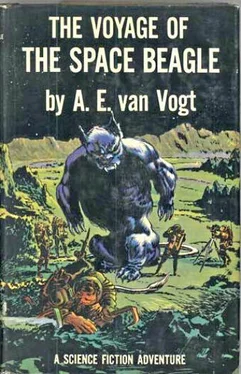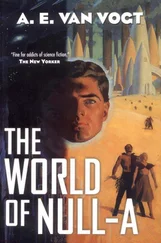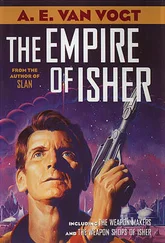Captain Leeth said unhappily, “Not so fast. I want to hear more of Mr. Grosvenor’s objections.”
Grosvenor said, “If we had time, it might be interesting to see how this creature reacts to such energized walls.”
A man said irritably, “I don’t get the argument. Why, if this creature ever gets caught between two energized levels, that’s the end of him. We know he can’t get through.”
“We don’t know anything of the kind,” Grosvenor said firmly. “All we know is that he got into a wall of force, and that he escaped. We assume he didn’t like it. In fact, it seems clear that he definitely could not remain in such an energy field for any length of time. It is our misfortune, however, that we cannot use a full force screen against him. The walls, as Mr. Pennons pointed out, would melt. My point is, he escaped from what we’ve got”
Captain Leeth looked disconcerted. “Gentlemen,” he said, “why was this point not brought out at the discussion? It is certainly a valid objection.”
Morton said, “I was in favour of inviting Grosvenor to the discussion, but I was voted down on the basis of a long-standing custom, whereby the man whose plan is under consideration is not present. For the same reason, the two physicists were not invited.”
Siedel cleared his throat. “I don’t think,” he said, “that Mr. Grosvenor realizes what he has just done to us. We have all been assured that the ship’s energy screen is one of man’s greatest scientific achievements. This has given me personally a sense of well being and security. Now he tells us this being can penetrate it.”
Grosvenor said, “I didn’t say the ship’s screen was vulnerable, Mr. Siedel. In fact, there is reason to believe the enemy could not and cannot get through it. The reason is that he waited beyond it till we brought him inside it. The floor energization, now being discussed, is a considerably weaker version.”
“Still,” said the psychologist, “don’t you think the experts unconsciously assumed a similarity between the two forms?
The rationale would be: If this energization is ineffective, then we are lost. Therefore, it must be effective.”
Captain Leeth broke in wearily. “I’m afraid that Mr. Siedel has accurately analysed our weakness. I recall now having such a thought.”
From the centre of the room, Smith said, “Perhaps we’d better hear Mr. Grosvenor’s alternative plan.”
Captain Leeth glanced at Morton, who hesitated, then said, “He suggested that we divide ourselves into as many groups as there are atomic projectors aboard—”
That was as far as he got. A physics technician said in a shocked voice, “Atomic energy — inside a ship!”
The uproar that began lasted for more than a minute. When it died away, Morton went on as if there had been no interruption.
“We have forty-one such projectors at the moment. If we accepted Mr. Grosvenor’s plan, each one would be manned by a nucleus of military personnel, with the rest of us spread out as bait within sight of one of the projectors. Those manning the projector would be under orders to activate it even if one or more of us is in the line of fire.”
Morton shook his head slightly, and went on. “It is possibly the most effective suggestion that has been put forward. However, the ruthlessness of it shocked us all. The idea of firing at one’s own people, while not new, strikes much deeper than Mr. Grosvenor — I think — realizes. In fairness, though, I must add that there was one other factor that decided the scientists against it. Captain Leeth stipulated that those who acted as bait must be unarmed. To most of us, that was carrying the thing too far. Every man should be entitled to defend himself.” The Director shrugged. “Since there was an alternative plan, we voted for it. I am now personally in favour of Mr. Grosvenor’s idea, but I still object to Captain Leeth’s stipulation.”
At the first mention of the commander’s suggestion Grosvenor had swung around and stared at the officer. Captain Leeth looked back steadily, almost grimly. After a moment, Grosvenor said aloud in a deliberate tone, “I think you ought to take the risk, Captain.”
The commander acknowledged the words with a slight, formal bow. “Very well,” he said, “I withdraw my stipulation.”
Grosvenor saw that Morton was puzzled by the brief interchange. The Director glanced at him, then at the captain, then back again to Grosvenor. Then a startled look flashed into his heavy-set face. He came down the narrow metal steps and over to Grosvenor. He said in a low tone, “To think that I never realized what he was getting at. He obviously believes that in a crisis….” He stopped, and turned to stare up at Captain Leeth.
Grosvenor said placatingly, “I think he now realizes he made a mistake in bringing up the matter.”
Morton nodded, and said reluctantly, “I suppose, when you come right down to it, he’s right. The impulse to survive, being basic, could supersede all subsequent conditionings. Still” — he frowned — “we’d better not mention it. I think the scientists would feel insulted, and there’s enough bad feeling aboard.”
He turned and faced the group. “Gentlemen,” he said resonantly, “it seems clear that Mr. Grosvenor has made a case for his plan. All in favour of it, raise their hands.”
To Grosvenor’s intense disappointment, only about half a hundred hands came up, Morton hesitated, then said, “All against, raise theirs.”
This time just over a dozen hands were raised.
Morton pointed at a man in the front line. “You didn’t put yours up either time. What seems to be the trouble?”
The man shrugged. “I’m neutral. I don’t know whether I’m for it or against it. I don’t know enough.”
“And you?” Morton indicated another individual.
The man said, “What about secondary radiation?”
Captain Leeth answered that. “We’ll block it off. We’ll seal the entire area.” He broke off. “Director,” he said, “I don’t understand why this delay. The vote was fifty-nine to fourteen in favour of the Grosvenor plan. While my jurisdiction over scientists is limited even during a crisis, I regard that as a decisive vote.”
Morton seemed taken back. “But,” he protested, “nearly eight hundred men abstained.”
Captain Leeth’s tone was formal. “That was their privilege. It is expected that grown men know their own minds. The whole idea of democracy is based on that supposition. Accordingly, I order that we act at once.”
Morton hesitated, then said slowly, “Well, gentlemen, I am compelled to agree. I think we’d better get about our business. It’ll take time to set up the atomic projectors, so let’s start energizing levels seven and nine while we’re waiting. As I see it, we might as well combine the two plans, and abandon one or the other depending on the developing situation.”
“Now that,” said a man, with evident relief, “makes sense.”
The suggestion seemed to make sense to a lot of the men. Resentful faces relaxed. Somebody cheered, and presently the great human mass was flowing out of the huge chamber. Grosvenor turned to Morton.
“That was a stroke of genius,” he said. “I was too set against such limited energization to have thought of such a compromise.”
Morton acknowledged the compliment gravely. “I was holding it in reserve,” he said. “In dealing with human beings, I’ve noticed there is usually not only a problem to be solved but the matter of tension among those who have to solve it.” He shrugged. “During danger, hard work. During hard work, relaxation in every practicable form.”
He held out his hand. “Well, good luck, young man. Hope you come through safely.”
Читать дальше











